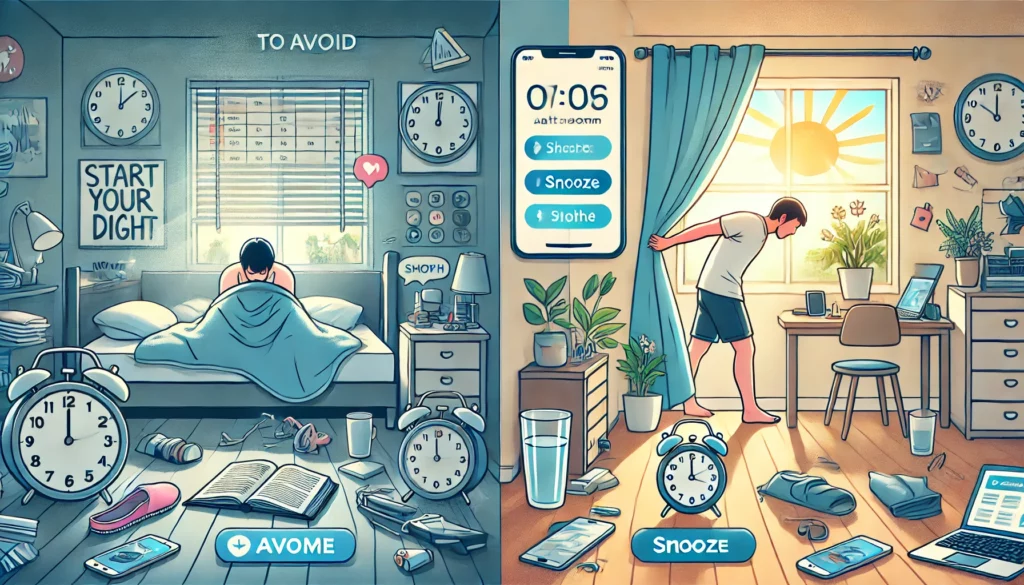How you begin your morning often determines the tone of your entire day. A sluggish or stressful start can affect your mood, focus, and productivity for hours to come. While many people talk about the importance of morning routines and to-do lists, what you avoid in the first hour after waking can be just as impactful—if not more.
Some common habits may feel harmless, but they can drain your energy, cloud your thinking, and put you in a reactive mindset before the day even begins. By recognizing and changing these patterns, you’ll set yourself up for a more focused and intentional day.
Here’s what to avoid right after waking up—plus what to do instead.
1. Hitting the Snooze Button
It’s tempting to squeeze in a few extra minutes of sleep by tapping the snooze button, but it doesn’t help you feel more rested. In fact, it does the opposite.
When you hit snooze and drift back to sleep, your body enters a new sleep cycle. But since you’re waking up again just minutes later, that sleep is fragmented and low-quality. This contributes to what’s called sleep inertia—a groggy, disoriented feeling that can last for hours.
What to do instead:
Place your alarm across the room, so you have to physically get up to turn it off. Choose an alarm that increases in volume gradually to avoid being startled awake. And stick to a consistent wake-up time every day, including weekends, to help train your internal clock.
2. Checking Your Phone Immediately
One of the most common modern habits is checking your phone the moment your eyes open. Whether it’s emails, social media, or news, this rush of information can hijack your mental space before your day even starts.
You begin in reactive mode—responding to messages, reading updates, or falling into comparison on social media. This can increase anxiety and make it harder to focus on your own goals and priorities.
What to do instead:
Keep your phone out of reach from your bed, or in another room entirely. Give yourself at least 30 minutes of screen-free time in the morning. Replace the habit with something more grounding, like drinking water, stretching, or reviewing your top three goals for the day.
3. Staying in Bed Too Long
It may feel luxurious to lie in bed for a while after waking up, but this habit can backfire. The longer you stay horizontal, the harder it becomes to shake off sleepiness. You might even start overthinking, replaying worries or to-dos in your head before you’ve even stood up.
What to do instead:
Aim to get out of bed within five minutes of waking. If you need a gentle transition, sit up, open the curtains, or take a few deep breaths. Moving your body—even just walking around your room—helps send the signal to your brain that it’s time to start the day.
4. Skipping Water
Your body becomes naturally dehydrated overnight. Without water, your energy levels, digestion, and brain function can all suffer. Starting your day without rehydrating is like trying to drive a car without gas.
What to do instead:
Drink a glass of water as soon as you wake up—before coffee, breakfast, or anything else. You can even prepare it the night before and keep it on your nightstand. Adding lemon or a pinch of sea salt can support hydration and digestion.
5. Jumping Straight Into Work or Emails
While it may feel productive to start tackling emails or work tasks right away, doing so can overload your brain before it’s fully alert. It puts you into reactive mode, where you’re responding to others’ needs instead of setting your own agenda for the day.
What to do instead:
Create a short buffer between waking up and starting work. Use this time for a calm morning ritual—reading, journaling, light movement, or reviewing your plan for the day. Even just 20 to 30 minutes of intentional time can make a big difference.
6. Eating a Sugary or Heavy Breakfast (or Skipping It)
Your first meal of the day fuels your brain and body. A high-sugar breakfast (think pastries, sweetened cereals, or processed foods) can cause your blood sugar to spike and crash, leaving you tired and unfocused just a few hours later. On the other hand, skipping breakfast entirely may lead to low energy and overeating later in the day.
What to do instead:
If you eat breakfast, aim for something balanced—protein, healthy fats, and fiber. Good options include eggs, oatmeal with nuts, avocado toast, or a smoothie with greens and nut butter. If you practice intermittent fasting, make sure your first meal is nutrient-dense and not overly processed.
7. Avoiding Natural Light
Your circadian rhythm—the internal clock that controls sleep and alertness—is heavily influenced by light. Exposure to natural light in the morning helps signal to your body that it’s time to wake up and be alert.
Sitting in a dark room or under artificial lighting slows that process and can lead to drowsiness throughout the day.
What to do instead:
Get natural light within the first 30 minutes of waking. Open your blinds, step outside for a few minutes, or sit near a window. If sunlight isn’t an option (especially during winter), a light therapy lamp can offer similar benefits.
8. Starting the Day With a Negative Mindset
The thoughts you entertain first thing in the morning have a way of shaping the rest of your day. If you begin with frustration, stress, or negative self-talk, it becomes easier to carry that energy into your work, relationships, and mood.
What to do instead:
Practice a simple mindset shift. This could be writing down three things you’re grateful for, repeating a positive affirmation, or simply taking a few deep breaths while setting an intention for the day. Even a small moment of reflection can dramatically improve your outlook.
Final Thought: Start with Intention, Not Reaction
What you don’t do in the morning is just as important as what you do. By avoiding habits that drain your energy and focus, you create space for clarity, intention, and productivity.
You don’t need to overhaul your entire morning all at once. Just pick one habit to eliminate and replace it with something more empowering. Over time, these small changes add up—and you’ll start each day with a greater sense of control and purpose.
Start tomorrow: Choose one morning habit from this list to change. Replace it with a small, positive action—and notice how your day begins to improve from the moment you wake up.
Gabriel Silva is the founder of Cursos e Soluções, a blog dedicated to personal growth, habit change, and self-discipline. Passionate about self-development and productivity, he shares practical, research-backed strategies to help people achieve their goals. He believes that small, consistent changes can lead to significant transformations over time and is committed to providing content that empowers both personal and professional success.







